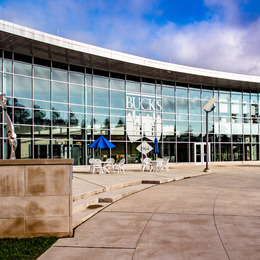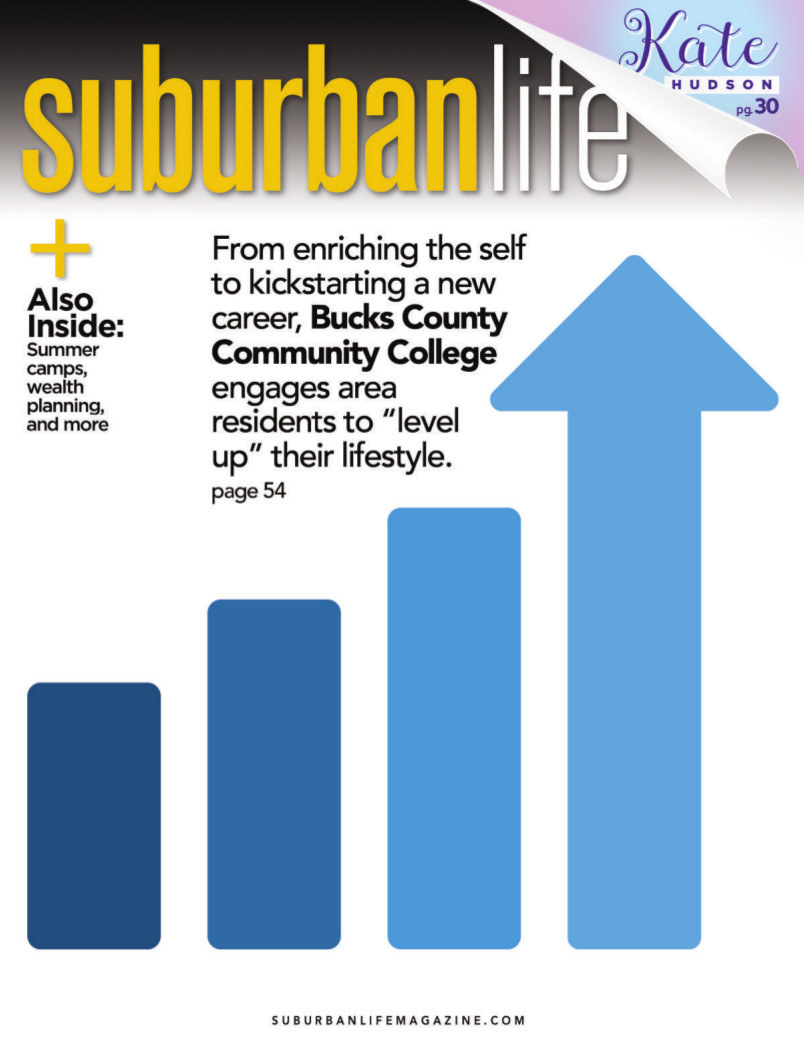
Time to Restart
From enriching the self to kickstarting a new career, Bucks County Community College engages area residents to “level up” their lifestyle.
The COVID-19 pandemic upended the American way of life. Some people lost jobs. Others put professional development plans on hold. Some simply felt as if the world suddenly stopped turning.
Now more than ever, Bucks County Community College (Bucks) stands ready to help area residents move forward again—reengaged and reenergized. Much more than just an educational institution for earning an associate’s degree or working toward a bachelor’s degree, Bucks has positioned itself as a community-wide resource where people of all ages—“from five to ninety-five”—find innovative opportunities to learn and grow.
“People are hungry for new experiences,” says Tracy A. Timby, Bucks’ interim associate vice president for strategic partnerships. “You look around and see high school students now writing college essays who have been in quarantine since they were sixteen. How do you set yourself apart when you’re applying to colleges when everyone has essentially had the same experience? For the adult population, so many people lost jobs or are in transition, so they need additional skills. We are a resource in the community for all of those areas.”
Learning Something New
Donna Kirn loves her job, because she gets to see evidence of personal transformation on a daily basis. As Bucks’ director of community education and professional certification, she oversees an array of business and community education courses designed to fuel the imagination and help people take steps forward in their careers—something the school has been doing since the 1980s.
“Everyone wants to learn something new,” says Kirn. “People can come here and learn a new skill and build new relationships, whether it’s a six-week course or a two-hour workshop. I took a workshop here that taught me how to make ricotta. I sat in on another class called ‘Meet the Beatles,’ where people connected over a common interest. Every weekend people can come here and learn something different. After the year we’ve had, people are thirsting for it.”
Each year, Bucks processes more than 5,000 registrations for 300-plus courses. The programming lineup changes regularly. Current personal enrichment offerings span the arts (painting, drawing, photography), music (guitar, djembe drums, Celtic fiddle), foreign languages (Spanish, French, German) and history and special interests (American sign language, Jacksonian America, the films of Martin Scorsese). For the time being, the majority of classes remain remote, though Bucks looks forward to returning to face to face instruction as well as remote course options in the fall.
“We do look at trends when putting together our courses, but the great thing about a school like ours is that people come to us wanting to share their skills with other people,” Kirn says. “You can come here and learn about archaeology or how to play the African djembe drums, which is something a lot of people probably haven’t even heard of.”
For those interested in changing careers, Bucks provides a number of professional development and certificate programs. One of the most popular is the floral design certificate program through a partnership with the American Institute of Floral Designers. There’s even an aviation program called Private Pilot Ground School, through Infinity Flight Group, in which people as young as 15 can pursue their passion for flying.
Children get in on the fun, too, through a summer program called Kids on Campus, which Bucks has been offering for more than 30 years. Kids as young as five to fourteen and older can participate in a range of camps, including those devoted to fishing, golf, mock trial, STEAM (science, technology, engineering, art, mathematics), and theater. Kirn is happy to report that, after doing the camps remotely in 2020, Bucks has adopted safety protocols that will enable it to return to in-person camps this summer.
“That’s why we say we serve everyone from five to ninety-five,” she says. “Whether people want to learn a new hobby, gain a new skill, or just have fun, they’ll find it here.”
Leveling Up
Likewise, Bucks has become a conduit between area businesses and prospective employees. Susan Herring, Bucks’ executive director of the center for workforce development, says the college partners with nearly 100 different companies in the area, across multiple industries, ranging from manufacturing and health care to nonprofit organizations and car dealerships.
“We listen very closely to our business partners about the challenges they may be experiencing and ask them what kind of skills they need,” says Herring. “If we’re not training workers in the skills and abilities that companies need, we’re spinning our wheels. We also work with the management to problem solve and meet the demands of their organizations. That ranges from first-line supervisory skills to DEI (diversity, equity, and inclusion) training to team building and executive coaching.”
Bucks has particularly strong ties to the area’s strong manufacturing base. The notion that manufacturing is a dying industry in America is misguided, according to Herring. Manufacturing companies are now producing the same output, if not more, with fewer people, meaning they have an increased demand for highly skilled workers—with greater earning potential. She cites one of the college’s manufacturing programs, which will soon graduate nine people. As of press time, the college had 20 companies lined up to interview and employ them.
“My students typically are not degree seeking, but they are seeking ways to move forward in their careers,” she says. “There are thousands of small to medium-sized manufacturing companies in the region. We try to work with as many of them as possible to provide entry-level talent to receive into their businesses. These are life-transforming opportunities in good-paying careers.”
In addition to its two 12-week manufacturing programs, Bucks offers an eight-week Microsoft Office training program and a seven-week bookkeeping with QuickBooks certification program. Each program includes access to a dedicated career coach designed to help students with soft skills, such as interviewing and crafting a résumé.
Herring is excited to share that Bucks has broken ground on a new Center for Advanced Technologies on the college’s Bristol campus. The new center, which is slated to open in May 2022, will enable the college to expand training opportunities for employers and employment opportunities for job seekers.
“Of all the things we’ve learned in the past year, it’s that people are capable of learning new things in a quick manner,” Timby adds. “We have a vast offering for people who not only want degrees but also short-term certifications and skills training that they can achieve in a brief amount of time.”
Timby, who joined Bucks after a career as an attorney, came to the college because she realized the scope of the positive impact her work could have on people. Bucks is an adaptable, dynamic, and engaging place, she says, one that evolves along with the needs of the community.
“We’re uniquely positioned to support people in their work life and family life, with all the resources a local community might need to level up,” she says.
For more information on Bucks County Community College, visit bucks.edu or call (215) 968-8000. Go to bucks.edu/coned for specifics on community education and professional certifications, and bucks.edu/wfd for details on workforce development programs.
Photograph courtesy of Bucks County Community College
Published (and copyrighted) in Suburban Life magazine, March 2021.



